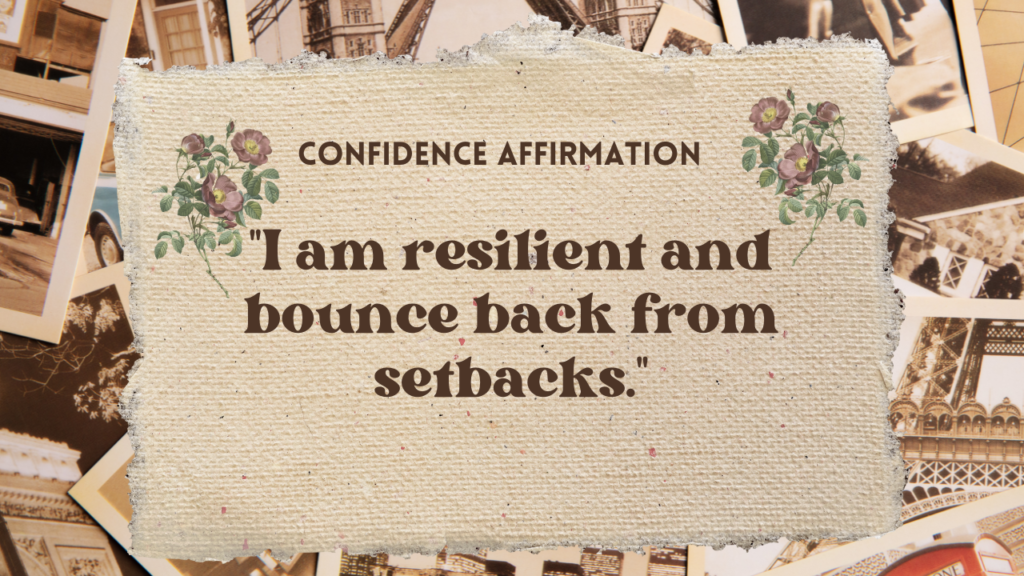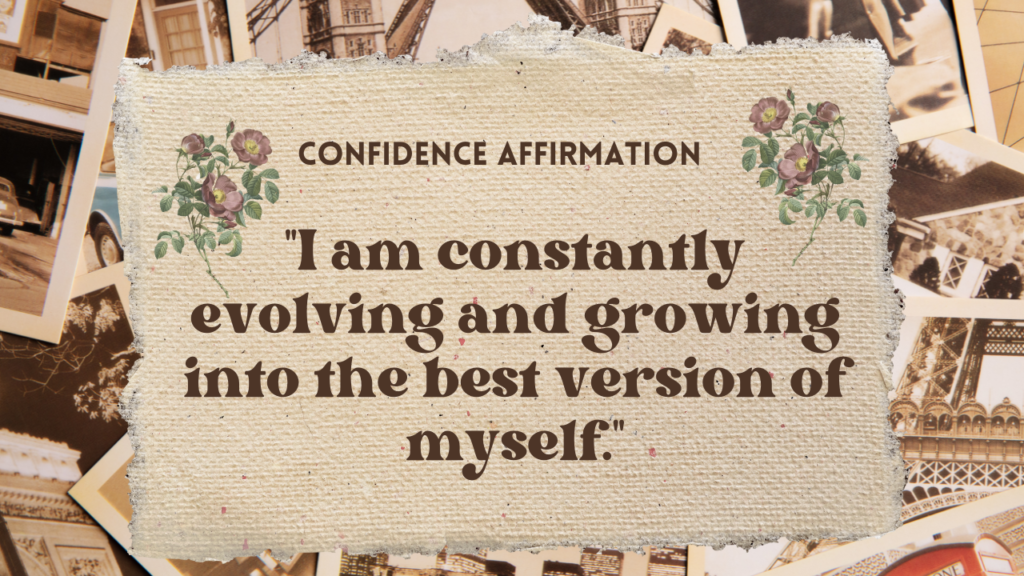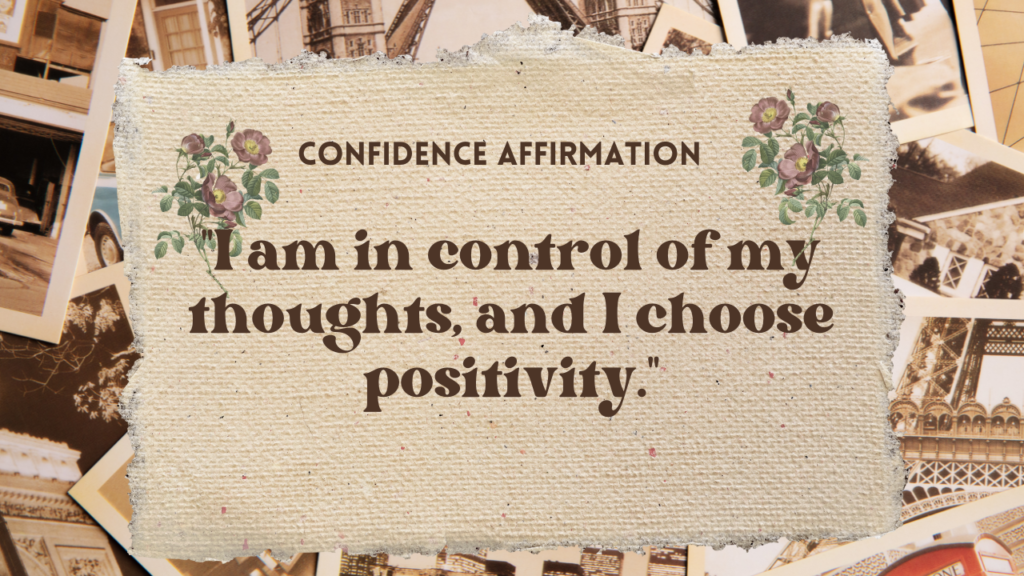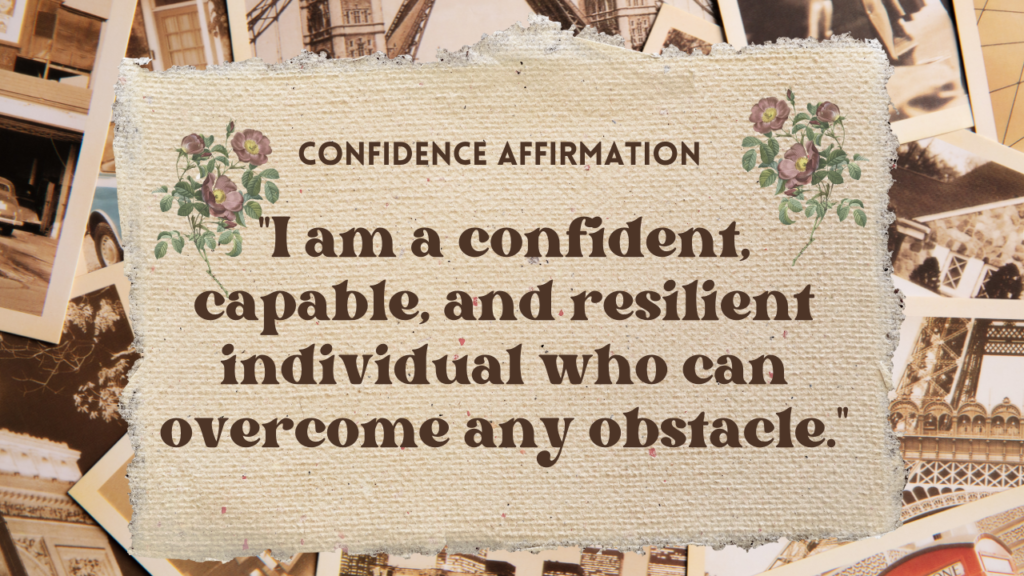Table of Contents
Introduction
Affirmations for confidence play a vital role in empowering an individual to radiate self-assurance and navigate life’s challenges with unwavering belief in their abilities. Affirmations are defined as positive statements or declarations which serve as the cornerstone for cultivating a resilient and confident self. Affirmations play a vital role in fostering a positive mindset and influence a person to make themselves more nourished and positive by delving into the profound significance of confidence, self-esteem, and self-worth, highlighting their interconnected roles in shaping our overall well-being.
Confidence, self-esteem, and self-worth are one of the most important tools in shaping an individual’s overall well-being. Confidence relates to a person’s self-assurance and belief in their abilities, while self-esteem pertains to the value one places on themselves. Self-worth goes a step further, encompassing a deeper sense of personal value and deservingness. Understanding and nurturing these aspects are crucial for a healthy and fulfilling life.
By examining the relationship between affirmations and self-assurance, the article aims to provide practical insights and guidance for readers to incorporate affirmations into their daily lives. The overarching purpose is to empower individuals to leverage affirmations as a tool for enhancing their confidence, ultimately contributing to a more positive and resilient mindset.
Understanding confidence
Confidence is a psychological state characterised by a positive and assured belief in one’s abilities, judgement, and aptitude. It involves a sense of self-assurance, self-reliance, and the conviction that one can navigate challenges and achieve success. Confidence is not static but can be cultivated and developed through experiences, self-reflection, and personal growth.
Impact of confidence on daily life:
Confidence plays a pivotal role in shaping various aspects of an individual’s daily life. It influences decision-making, risk-taking, and the willingness to tackle new challenges. A confident person tends to approach tasks with a proactive mindset, demonstrating resilience in the face of setbacks. In social interactions, confidence fosters effective communication, assertiveness, and the ability to build positive relationships. Additionally, confidence contributes to a more optimistic outlook on life, enhancing overall mental well-being.
Connection between confidence, self-esteem, and self-worth:
Confidence is closely intertwined with both self-esteem and self-worth. Self-esteem refers to the overall subjective evaluation of one’s worth and capabilities. Confidence, being a component of self-esteem, reflects a specific belief in one’s ability to perform particular tasks or face specific challenges. Self-worth, on the other hand, extends beyond confidence and self-esteem, encompassing a deeper sense of intrinsic value as a person. The three concepts are interconnected, with improvements in one often leading to enhancements in the others. Understanding this intricate relationship is essential for individuals seeking to foster a holistic and positive self-image.
Scientific evidence supporting the effectiveness of affirmations
Numerous studies in the field of psychology and neuroscience have explored the impact of affirmations on mental well-being. Scientific evidence suggests that affirmations can lead to positive changes in self-perception, self-esteem, and overall psychological functioning. Neuroimaging studies have shown that affirmations can influence the brain’s neural pathways, indicating the potential for measurable changes in thought processes. Additionally, research has highlighted the effectiveness of affirmations in reducing stress, improving performance, and enhancing overall emotional well-being. Understanding the scientific basis behind affirmations adds credibility to their efficacy as a valuable tool for mindset transformation.
30 Affirmations for Confidence: Boosting Self-Esteem and Self-Worth

- “I believe in my abilities to overcome challenges.”
- Challenge Yourself: Confront a small challenge head-on and celebrate your success afterward.

- “I radiate self-confidence and inner strength.”
- Challenge Yourself: Stand tall, maintain eye contact, and confidently express your thoughts in a conversation.

- “I am comfortable in my own skin and embrace my uniqueness.”
- Challenge Yourself: Compliment yourself on one unique quality each day.

- “I trust my intuition and make decisions with confidence.”
- Challenge Yourself: Trust your gut feelings in a decision today, regardless of its size.

- “My thoughts and opinions matter, and I express them with conviction.”
- Challenge Yourself: Speak up in a meeting or discussion, sharing your perspective confidently.

- “I am resilient and bounce back from setbacks.”
- Challenge Yourself: Turn a setback into a learning opportunity and outline the lessons gained.

- “I am a magnet for positive opportunities and experiences.”
- Challenge Yourself: Look for and capitalize on a positive opportunity today.

- “I am capable of handling whatever comes my way.”
- Challenge Yourself: Tackle a task outside your comfort zone and acknowledge your capability.

- “I exude confidence and inspire others to believe in themselves.”
- Challenge Yourself: Encourage someone else to take on a challenge by expressing your belief in their abilities.

- “I am constantly evolving and growing into the best version of myself.”
- Challenge Yourself: Identify one area for personal growth and take a small step towards it.

- “I am not defined by my past; I create my own future.”
- Challenge Yourself: Release one negative belief about yourself and replace it with a positive one.

- “I face uncertainty with confidence and adaptability.”
- Challenge Yourself: Approach a situation with an open mind and adapt to unexpected changes gracefully.

- “I attract positive, supportive, and uplifting people into my life.”
- Challenge Yourself: Connect with someone who inspires and uplifts you.

- “I deserve to be treated with kindness, respect, and love.”
- Challenge Yourself: Communicate your boundaries clearly in a personal or professional relationship.

- “I am a confident communicator, and my words have power.”
- Challenge Yourself: Communicate a message or idea with clarity and conviction.

- “I am in control of my thoughts, and I choose positivity.”
- Challenge Yourself: Catch and replace negative thoughts with positive ones throughout the day.

- “I celebrate my achievements, big and small.”
- Challenge Yourself: Catch and replace negative thoughts with positive ones throughout the day.

- “I release self-doubt and embrace my inner strength.”
- Challenge Yourself: Identify one area where self-doubt holds you back and challenge that belief with positive affirmations.

- “I am open to new opportunities and embrace change with enthusiasm.”
- Challenge Yourself: Seek out a new experience or opportunity that you might have hesitated to try before.

- “I trust the journey of my life and believe everything happens for my highest good.”
- Challenge Yourself: Find meaning or a positive aspect in a recent challenging situation.

- “I let go of perfectionism and embrace progress over perfection.”
- Challenge Yourself: Start a project without worrying about achieving perfection, focusing on progress instead.

- “I am a confident decision-maker, and I trust my choices.”
- Challenge Yourself: Make a decision you’ve been procrastinating on and trust your choice.

- “I am deserving of love and respect in all aspects of my life.”
- Challenge Yourself: Assess a relationship and take action if it doesn’t align with your deserving of love and respect.

- “I am surrounded by abundance, and I attract prosperity into my life.”
- Challenge Yourself: Express gratitude for the abundance in your life, no matter how small.

- “I face challenges with courage and turn obstacles into stepping stones.”
- Challenge Yourself: Identify a current challenge and brainstorm ways to turn it into an opportunity for growth.

- “I let go of comparison and focus on my unique journey.”
- Challenge Yourself: Catch yourself in a moment of comparison and redirect your focus to your unique qualities and strengths.

- “I embrace the unknown as an opportunity for growth and discovery.”
- Challenge Yourself: Approach an uncertain situation with curiosity and an open mind.

- “I am the architect of my life, and I create it with intention and purpose.”
- Challenge Yourself: Set a specific goal for the month and create a plan to achieve it.

- “I am a confident, capable, and resilient individual who can overcome any obstacle.”
- Challenge Yourself: Reflect on a past obstacle you successfully overcame, reinforcing your belief in your abilities.
- “I am worthy of success and happiness.”
- Challenge Yourself: Set a specific goal for the day and take a step toward achieving it.
Additional Strategies for Confidence Building
1. Complementary practices to affirmations:
In addition to affirmations, there are various complementary practices that individuals can incorporate into their routine to boost confidence. These may include mindfulness meditation, visualisation techniques, and goal-setting exercises. Combining these practices with affirmations can create a synergistic effect, addressing different aspects of mindset and personal development for comprehensive confidence building.
2. Seeking support from others:
Building confidence is not a solitary journey, and seeking support from others can be instrumental. This may involve confiding in friends, family, or mentors who can offer encouragement, constructive feedback, and a fresh perspective. Social support provides a valuable external perspective, reinforcing one’s self-belief and fostering a sense of connection and community.
3. Embracing a growth mindset for continuous improvement:
Embracing a growth mindset involves viewing challenges as opportunities for learning and development rather than as insurmountable obstacles. Individuals with a growth mindset see their abilities and intelligence as malleable, leading to a willingness to take on new challenges. Cultivating a growth mindset contributes to continuous improvement and resilience, key components of building and sustaining confidence over the long term. This perspective encourages individuals to see setbacks as part of the learning process and motivates them to persevere in the face of challenges.
How To Overcome Common Confidence Challenges
1. Addressing self-doubt and negative self-talk:
Self-doubt and negative self-talk are common challenges that can undermine confidence. To address these issues, individuals need to cultivate self-awareness and challenge the accuracy of negative thoughts. Techniques such as reframing negative statements into positive affirmations, practising self-compassion, and building a positive inner dialogue can be effective in countering self-doubt and fostering a more confident mindset.
2. Dealing with setbacks and failures:
Setbacks and failures are inevitable in any journey towards building confidence. Rather than viewing them as permanent obstacles, it’s crucial to see setbacks as valuable learning experiences. Embracing a resilient mindset involves reframing failures as opportunities for growth, extracting lessons from them, and using the newfound knowledge to adapt and improve. Accepting that setbacks are a natural part of the learning process contributes to a more positive and forward-looking attitude.
3. Seeking professional help when needed:
Sometimes, overcoming confidence challenges may require professional assistance. Seeking help from psychologists, counsellors, or coaches who specialise in confidence-building can provide individuals with tailored strategies and support. Professional guidance offers a structured and personalised approach to address underlying issues, helping individuals navigate challenges more effectively and develop lasting confidence. Recognizing the need for external support is a proactive step towards building a strong foundation for sustained confidence and personal growth.
Conclusion:
The exploration of affirmations for confidence reveals the profound impact these positive statements can have on shaping our mindset and, consequently, our lives. Understanding the intricacies of confidence, self-esteem, and self-worth has underscored their interconnected roles in fostering a resilient and empowered self.
Building a consistent affirmation practice involves establishing a daily routine, overcoming challenges, and celebrating achievements. By taking small, consistent steps and recognizing setbacks as opportunities for growth, individuals can cultivate a mindset that fosters confidence, self-esteem, and self-worth. The transformative power of affirmations lies not only in their words but in the intentional practice and belief in their potential to shape a more positive and empowered self.


Thank you for sharing such valuable information!
Your article helped me a lot, is there any more related content? Thanks!